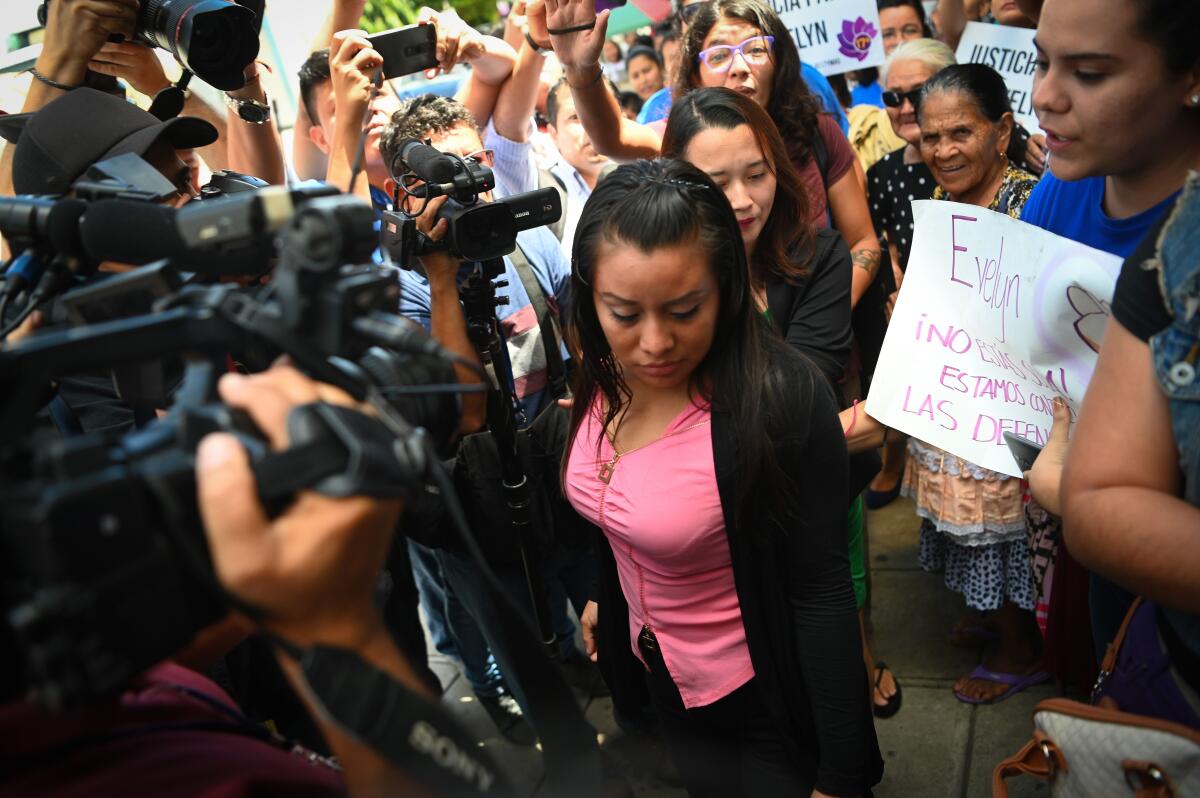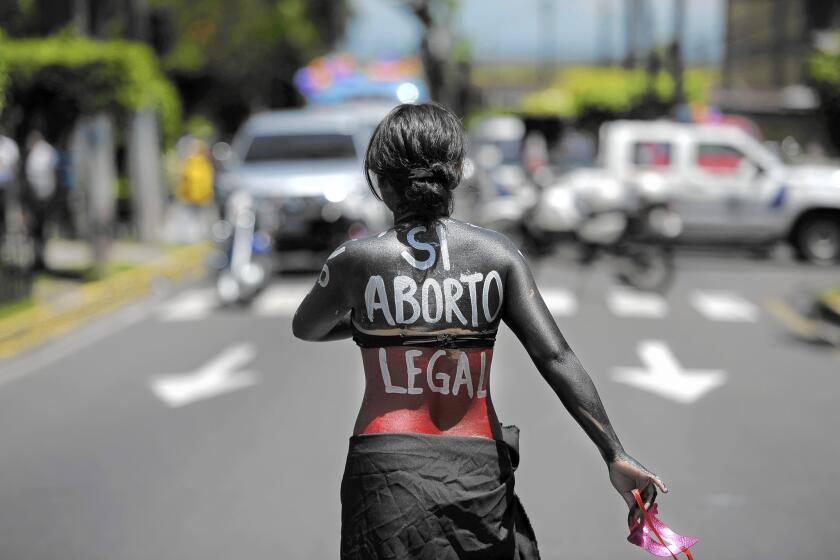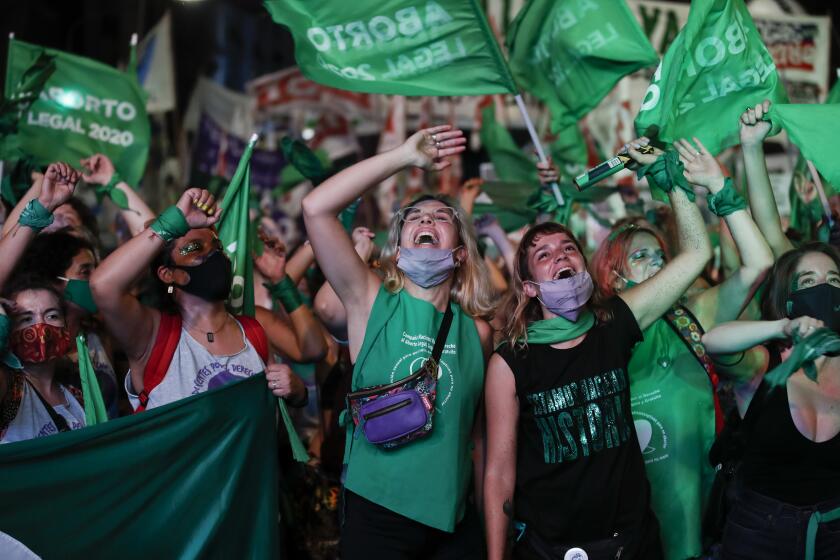International court could press El Salvador to change abortion ban
About seven months into her pregnancy, Manuela passed out at her family home in a rural part of Morozán in northeast El Salvador.
Her frightened relatives, who had no car, carried her in a hammock to a hospital many miles away. There, a physician asked the groggy woman, who was hemorrhaging and had lumps on her neck, for her husband. He’d migrated to the U.S., she said.
The doctor called the police, assuming Manuela had cheated on her husband and induced an abortion to get rid of the evidence. An officer shackled her to the hospital bed.
Authorities later found a dead fetus at the family home, according to legal documents and court hearings. Within months, Manuela was sentenced to 30 years in prison for aggravated homicide.
El Salvador is among two dozen countries worldwide that enforce total bans on abortion, meaning no exceptions for rape victims or when a mother’s life is in danger. The country is front and center in a case involving what happened to Manuela that is before the Inter-American Court of Human Rights, part of the Organization of American States, and that reproductive rights activists hope will result in a dramatic easing of abortion restrictions.
When Guadalupe Vasquez became pregnant at 17 after being raped by a neighbor of the house where she worked as a maid, she decided she wanted the baby.
Salvadoran women can face two to eight years in prison for having an abortion during the first 20 weeks of pregnancy. Women accused of terminating pregnancies that are further along sometimes are charged with manslaughter, homicide or aggravated homicide, which involve prison sentences of at least 30 years.
Doctors who perform the procedure can lose their licenses to practice and face up to 12 years of imprisonment. Many doctors encounter social pressure to report anyone suspected of having an abortion, according to court testimony and interviews.
Manuela, who had two sons, died of cancer at 33, just two years after her arrest in 2008. Since her death, she has become a symbol for activists pressing for women’s reproductive rights. Some banners at events like International Women’s Day say “Manuela justicia y esperanza” — Manuela justice and hope.
At a press conference in March, ahead of the hearing, Manuela’s oldest son, Santos de Jesús, said he doesn’t “want this to happen” to others, “because we children suffer. We’ve been suffering since we were little. We’ve had our grandma, but it’s not the same.”
Lawyers for the family say Manuela is a pseudonym, used to help shield her relatives from stigma and violence.
The attorneys hope to obtain reparations for the family, which would include psychological treatment and an apology from the Salvadoran government. They’re also calling for the court to review the convictions of women who’ve been incarcerated after suffering obstetric emergencies, to ensure that they received fair treatment through the Salvadoran judicial system.
Guillermo Ortiz, an obstetrician-gynecologist who worked for 20 years at a public hospital in El Salvador and testified in March before the Inter-American Court of Human Rights, described a work environment permeated with fear.
Failure to report suspected abortions, he said, placed doctors at risk of being considered accomplices. As a result, even health professionals who disagreed with the policy felt compelled to uphold it.
“They started to orient themselves toward trying to establish whether a crime had been committed,” said Ortiz, “even when dealing with cases of miscarriage.”
Police officers, he said, often entered examination rooms in search of women suspected of having abortions and shackled those who were still recovering to hospital beds. Much of his work involved negotiating with authorities, asking them to remove the handcuffs at least during exams or requesting female police officers in order to help the convalescing women feel more at ease, given that the hospital gowns afforded little privacy.
Lawyers from the Feminist Collective for Local Development in El Salvador and the Center for Reproductive Rights, a legal advocacy group with headquarters in New York, said in court that the physician who assumed that Manuela had been unfaithful relayed that assumption to authorities and in so doing activated proceedings against her.
Carmen Martínez, regional manager for Latin America and the Caribbean at the Center for Reproductive Rights, said at the hearing that police officers searching Manuela’s home taunted her relatives.
The documents detailing Manuela’s sentencing stated that she had the “ability to choose between having [the child], taking care of it and living for it like any biological mother would naturally do” but instead “opted for behavior that goes against nature itself.”
Martínez said the language speaks to a gender stereotype, in which — “even in the face of death” — a woman’s “highest function is to sacrifice herself in the name of reproduction.”
Elizabeth Urías, an attorney on El Salvador’s legal team, maintained that breaking doctor-patient confidentiality in the maternity ward is necessary to “protect boys and girls,” including the unborn.
According to the Salvadoran nonprofit Citizens’ Group for Decriminalizing Abortion, 181 women in the country were charged with abortion or aggravated homicide in relation to a dead fetus between 2000 and 2019.
In its most recent report, titled “From the Hospital to Prison,” the group says that more than half those women were reported to authorities by medical professionals and that 27 were convicted of aggravated homicide, with prison sentences ranging from 30 to 40 years. The bulk of the women were between 18 and 25 years old, often impoverished and from rural areas, with little education — much like Manuela.
According to the Center for Reproductive Rights, there are 15 women imprisoned in El Salvador under similar circumstances. Five others, including two minors, have been charged with abortion or aggravated homicide.

Just over two decades ago, El Salvador permitted abortions if a pregnancy resulted from rape or posed a risk to the mother’s life. The procedure was also allowed if the fetus had malformations.
But in the late 1990s, El Salvador revised its Constitution and penal code. Under pressure from religious groups, lawmakers defined life as beginning at conception and banned abortions — even when a pregnancy isn’t viable.
President Nayib Bukele has repeatedly expressed his opposition to abortion. Last year, he referred to abortion as a “great genocide” and said that rape victims — including minors — should be forced to bring pregnancies to term. Even so, he expressed some misgivings about enforcement of the law.
“One thing I do oppose is that in countries like ours, women are criminalized for having miscarriages, that because they’re poor, they are automatically accused of having an abortion,” he said. “That’s something I do think we can combat.”
The Manuela case, like the landmark Roe vs. Wade case of 1973 in the U.S., could have a major impact on El Salvador’s abortion policies.
A decision by the human rights court may be announced in September.
Many of those who oppose abortion fear the case will succeed. In conservative religious sectors, the case has been the subject of considerable media coverage. The Catholic News Agency, for instance — which produces content in five languages for distribution in more than 100 countries — warned that the case could “give the green light to abortion in El Salvador.”
Argentina legalizes abortion, becoming the biggest Latin American country to do so in a move likely to reverberate across the region.
More to Read
Sign up for Essential California
The most important California stories and recommendations in your inbox every morning.
You may occasionally receive promotional content from the Los Angeles Times.












